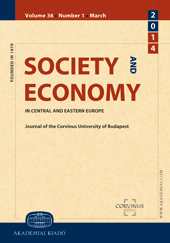A healthy Hungarian society in 2025: Vision or possible reality? Inexpensive preventive action plans, instead of a costly reorganization of public health services, for shaping health-conscious, future-oriented thinking
A healthy Hungarian society in 2025: Vision or possible reality? Inexpensive preventive action plans, instead of a costly reorganization of public health services, for shaping health-conscious, future-oriented thinking
Author(s): Zoltán VassSubject(s): Social development, Health and medicine and law, Demography and human biology, Migration Studies
Published by: Akadémiai Kiadó
Keywords: social regeneration; physical education; dynamic system approach; future-oriented attitude;
Summary/Abstract: If one extrapolates present social circumstances, one comes to the conclusion that much more emphasis should be placed on health and physical activity, possibly through the life-span development of younger generations, in order to avoid the negative influences of civilization. Otherwise, humans will not be able to compensate for the absence of health even with an enormous aggregation of financial and cultural goods. In other words, accumulated knowledge and capital are worth little without health. To deal with the new challenges of sport, health, and physical activity on their merits, the old-fashioned mode of thinking should be refashioned or should be replaced. This process is possible only with a number of substantial changes that will be able to influence common knowledge in order to educate an active, creative, healthy, and self-confident society. Today, in an economically and culturally unstable environment, the smallest effects can cause a number of unpredictable (favorable or unfavorable) changes in our everyday life due to negative feedback. For this very reason, in our knowledge-based society, optimal physical and mental health and their practical applicability in everyday life should be an achievable goal for the individual. This paper is addressed to explore the thinking of secondary school students about social regeneration in Hungary by asking them what kind of tools they can imagine which could help them achieve an optimal physical and mental health and how they can apply the knowledge in their future adult life. The young people involved in this research claim that physical education (PE) in secondary schools can provide an acceptable tool for the required regeneration and it can prove to be adequate in the formation of a health-confident society as well. The present paper claims, however, that physical education is able to fulfill this role only if it goes through massive structural changes taking the demands and claims of the younger generation into consideration.
Journal: Society and Economy. In Central and Eastern Europe ǀ Journal of the Corvinus University of Budapest
- Issue Year: 32/2010
- Issue No: 1
- Page Range: 65-82
- Page Count: 18
- Language: English

